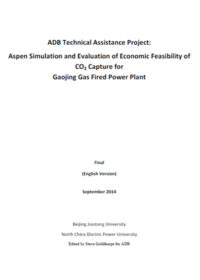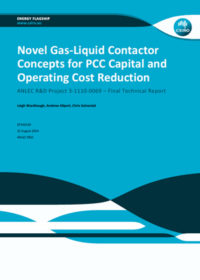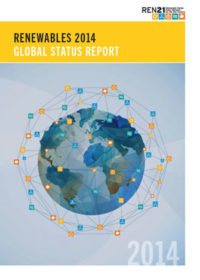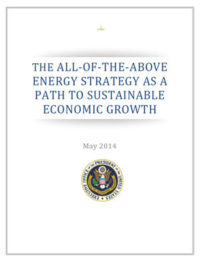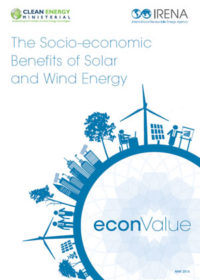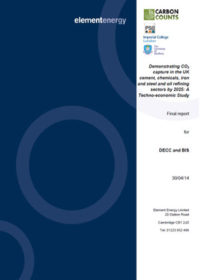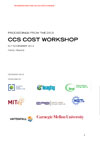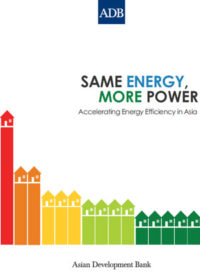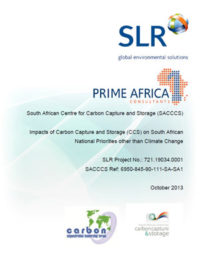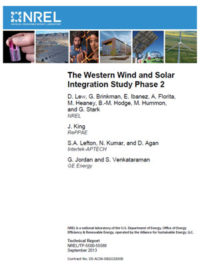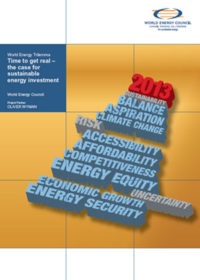Resources
Publications
Our publications, reports and research library hosts over 500 specialist reports and research papers on all topics associated with CCS.
View our Publication Library Disclaimer.
Filter by
ADB Technical Assistance Project: Aspen simulation and evaluation of economic feasibility of CO2 capture for Gaojing gas fired power plant
1st September 2014
Topic(s): Carbon capture use and storage (CCUS), Economics
This research project is an extension of the ADB-PRC joint initiative, Study on Carbon Capture and Storage in Natural Gas-Based Power Plants (TA-8001-PRC). What follows is a bottom-up economic assessment of the proposed Gaojing combined heat and power (CHP) CCS plant that:
- Evaluates CO2 capture energy consumption in different scenarios and optimize that consumption
- Makes an economic feasibility evaluation of Gaojing CHP’s CO2 capture retrofitting
- Evaluates the advantages of meeting capture-ready criteria in subsequent CCS implementation
- Recommends the capture-ready conditions for Gaojing CHP at different carbon capture rates
Disclaimer
The content within the Global CCS Institute Publications, Reports and Research Library is provided for information purposes only. We make every effort and take reasonable care to keep the content of this section up-to-date and error-free. However, we make no claim as to its accuracy, currency or reliability.
Content and material featured within this section of our website includes reports and research published by third parties. The content and material may include opinions and recommendations of third parties that do not reflect those held by the Global CCS Institute.
Novel gas-liquid contactor concepts for PCC capital and operating cost reduction
25th August 2014
Topic(s): Carbon capture use and storage (CCUS), CO2 capture, Economics
ANLEC R&D funded this CSIRO technical report that describes the development of a novel gas-liquid contactor aimed at reducing the capital and operating costs of Post Combustion Capture (PCC) commercial scale plants.
This project developed an innovative contactor which aimed to improve the economics of post combustion capture (PCC). The contactor design reduces the size of the column and eliminated the column packing, which enables an overall capital cost reduction of 30% and a power consumption reduction of 25%. Process optimisation in PCC deployment at scale will validate performance. However the concept has demonstrated excellent potential for cost savings and can be applicable to many existing technologies and processes.
Disclaimer
The content within the Global CCS Institute Publications, Reports and Research Library is provided for information purposes only. We make every effort and take reasonable care to keep the content of this section up-to-date and error-free. However, we make no claim as to its accuracy, currency or reliability.
Content and material featured within this section of our website includes reports and research published by third parties. The content and material may include opinions and recommendations of third parties that do not reflect those held by the Global CCS Institute.
Renewables 2014: global status report
3rd June 2014
Topic(s): Biofuels / Bioenergy, Economics, Geothermal energy, Global Status Report, Hydroelectricity, Marine energy, Policy law and regulation, Renewables, Solar energy, Wind energy
REN21’s Renewables Global Status Report provides a comprehensive and timely overview of renewable energy market, industry, investment, and policy developments worldwide. It enables policymakers, industry, investors, and civil society to make informed decisions.
The report covers recent developments, current status, and key trends; by design, it does not provide analysis or forecast.
The Renewables Global Status Report relies on up-to-date renewable energy data, provided by an international network of more than 500 contributors, researchers, and authors.
Disclaimer
The content within the Global CCS Institute Publications, Reports and Research Library is provided for information purposes only. We make every effort and take reasonable care to keep the content of this section up-to-date and error-free. However, we make no claim as to its accuracy, currency or reliability.
Content and material featured within this section of our website includes reports and research published by third parties. The content and material may include opinions and recommendations of third parties that do not reflect those held by the Global CCS Institute.
The all-of-the-above energy strategy as a path to sustainable economic growth
1st May 2014
Topic(s): Carbon capture use and storage (CCUS), Economics, Energy efficiency, Nuclear energy, Policy law and regulation, Renewables
The President of the United States has set out an aggressive All-of-the-Above strategy on energy. Some of the recent trends in the energy sector predate the Administration and stem from technological advances and risk-taking by American entrepreneurs and businesses, as well as from government-supported research and other public policies. The All-of-the-Above energy strategy supports these trends through environmentally responsible production of oil and natural gas. In addition, the Administration has advanced the growth of energy sources with low or zero carbon emissions through programs that support wind, solar, other renewables, and nuclear, and has also helped to reduce energy demand by promoting energy efficiency. The Administration is also supporting an ambitious program of carbon capture, utilization and storage for coal and natural gas power plants and for industrial facilities.
Disclaimer
The content within the Global CCS Institute Publications, Reports and Research Library is provided for information purposes only. We make every effort and take reasonable care to keep the content of this section up-to-date and error-free. However, we make no claim as to its accuracy, currency or reliability.
Content and material featured within this section of our website includes reports and research published by third parties. The content and material may include opinions and recommendations of third parties that do not reflect those held by the Global CCS Institute.
The socio-economic benefits of solar and wind energy
1st May 2014
Topic(s): Economics, Renewables, Solar energy, Wind energy
The Socio-economic Benefits of Solar and Wind, an econValue report, bridges the knowledge gap with a holistic analysis of the environmental, social and economic value created from large-scale solar and wind energy deployment. In doing so, it offers a new conceptual framework in support of ongoing analytical work conducted by IRENA and other partners in the Clean Energy Ministerial with a view to reinforcing the economic and business case for renewable energy.
Disclaimer
The content within the Global CCS Institute Publications, Reports and Research Library is provided for information purposes only. We make every effort and take reasonable care to keep the content of this section up-to-date and error-free. However, we make no claim as to its accuracy, currency or reliability.
Content and material featured within this section of our website includes reports and research published by third parties. The content and material may include opinions and recommendations of third parties that do not reflect those held by the Global CCS Institute.
Demonstrating CO2 capture in the UK cement, chemicals, iron and steel and oil refining sectors by 2025: a techno-economic study
30th April 2014
Topic(s): Carbon capture use and storage (CCUS), CO2 capture, Economics
In November 2013, the United Kingdom’s Department of Energy and Climate Change (DECC), and Department of Business Innovation & Skills (BIS) commissioned a team led by Element Energy, and comprising Carbon Counts, PSE, Imperial College and the University of Sheffield, to carry out a study of industrial CO2 capture for storage or utilisation.
The primary focus of this study is assessing the technical potential and cost effectiveness for retrofit deployment of different CO2 capture technologies to the UK’s existing largest (0.2-8 MtCO2/yr) sources of process CO2 emissions in the cement, chemicals, iron and steel, and oil refining sectors by 2025.
Disclaimer
The content within the Global CCS Institute Publications, Reports and Research Library is provided for information purposes only. We make every effort and take reasonable care to keep the content of this section up-to-date and error-free. However, we make no claim as to its accuracy, currency or reliability.
Content and material featured within this section of our website includes reports and research published by third parties. The content and material may include opinions and recommendations of third parties that do not reflect those held by the Global CCS Institute.
Energy efficiency – the first fuel for the EU economy: how to drive new finance for energy efficiency investments. Part 1: buildings (interim report)
2nd April 2014
Topic(s): Economics, Energy efficiency, Project financing
This interim report, prepared for the European Commission by the Energy Efficiency Financial Institutions Group, describes and addresses the need to increase the scale of energy efficiency investments across the European Union. Buildings are key energy consumers and greenhouse gas emitters - this report shows value in energy efficient investments in buildings that save energy and improve buildings’ financial performance.
Disclaimer
The content within the Global CCS Institute Publications, Reports and Research Library is provided for information purposes only. We make every effort and take reasonable care to keep the content of this section up-to-date and error-free. However, we make no claim as to its accuracy, currency or reliability.
Content and material featured within this section of our website includes reports and research published by third parties. The content and material may include opinions and recommendations of third parties that do not reflect those held by the Global CCS Institute.
Proceedings from the 2013 CCS Costs Workshop
1st December 2013
Topic(s): Carbon capture use and storage (CCUS), Economics
The International Energy Agency hosted the fourth meeting of the Expert Group on CCS costs on November 6-7 2013 in Paris.
The current knowledge regarding the costs of CCS applications - particularly for industry - were presented at the meeting and the agreed outcomes for the Group to take forward are included in these proceedings.
This work program consists of two streams of activities. The first stream, to improve the transparency of CCS cost calculations for industrial applications of CCS, included:
- Consideration of a number of case studies industrial applications and identification of the challenges that arose estimating costs.
- What types of methodologies are used to estimate costs for industrial applications and how do they differ from power cost estimation processes.
- Identification of costs in retrofit applications in the power sector, refinery, and demonstration plants currently under construction.
The second stream of activity focused on identifying and comparing the variety of methods used in cost estimation of new capture concepts and advanced technologies. Costs for this class of technology are the most uncertain, yet decisions on R&D priorities and scale-up of advanced process often depend on projections of future cost. Examples of approaches considered include:
- Probabilistic methods in conjunctions with traditional engineering economics
- ‘Learning curves’ to project future costs
- Expert elicitations regarding future cost and performance
- Risk-based methods associated with technology readiness levels
- Non-economic measure such as the projected energy penalty of alternative capture approaches
This paper includes links to the presentations and a summary of the discussion and outcomes from the meeting.
Disclaimer
The content within the Global CCS Institute Publications, Reports and Research Library is provided for information purposes only. We make every effort and take reasonable care to keep the content of this section up-to-date and error-free. However, we make no claim as to its accuracy, currency or reliability.
Content and material featured within this section of our website includes reports and research published by third parties. The content and material may include opinions and recommendations of third parties that do not reflect those held by the Global CCS Institute.
Same energy, more power: accelerating energy efficiency in Asia
10th October 2013
Topic(s): Economics, Energy efficiency, Policy law and regulation, Project financing
This ADB report identifies a 1%–4% investment in energy efficiency, as a share of overall energy sector investment, can meet as much as 25% of the projected increase in primary energy consumption in developing Asian countries by 2030. This cost-effective investment, in turn, can boost regional energy security by tempering the need for imported energy, as most countries in the region, 2 decades from now, will produce 50% or less of the energy they require. More generally, robust deployment of energy efficiency can relieve pressure on existing energy infrastructure while reducing emissions and other pollutants that harm air quality and contribute to climate change.
This report identifies key areas of interest for accelerating energy efficiency investments. The report also examines global and regional trends that are driving Asia’s energy demand and the resulting policy and regulatory environment for energy efficiency.
Disclaimer
The content within the Global CCS Institute Publications, Reports and Research Library is provided for information purposes only. We make every effort and take reasonable care to keep the content of this section up-to-date and error-free. However, we make no claim as to its accuracy, currency or reliability.
Content and material featured within this section of our website includes reports and research published by third parties. The content and material may include opinions and recommendations of third parties that do not reflect those held by the Global CCS Institute.
Impacts of carbon capture and storage (CCS) on South African national priorities other than climate change
1st October 2013
Topic(s): Carbon capture use and storage (CCUS), Economics
This report provides an assessment of the impact of deploying CCS on national priorities other than climate change in South Africa. The report is premised on the assumption that CCS will form part of an integrated basket of measures that include reducing energy consumption and expanding non-fossil energy systems including wind, solar, biomass and geothermal to reduce GHG emissions in South Africa. In contrast to other studies that have assessed the impacts of individual CCS projects, this study covers a much larger integrated CCS programme. This report does not compare the various options for GHG mitigation. Moreover, it is assumed, that South Africa would learn from successful pilot and demonstration projects around the world in the interim period and that the implementation of commercial roll out of full-scale CCS programme will be implemented post 2020.
Disclaimer
The content within the Global CCS Institute Publications, Reports and Research Library is provided for information purposes only. We make every effort and take reasonable care to keep the content of this section up-to-date and error-free. However, we make no claim as to its accuracy, currency or reliability.
Content and material featured within this section of our website includes reports and research published by third parties. The content and material may include opinions and recommendations of third parties that do not reflect those held by the Global CCS Institute.
The western wind and solar integration study phase 2
1st September 2013
Topic(s): Economics, Engineering and project delivery, Renewables
This report describes the findings of a National Renewable Energy Laboratory study into the costs and emissions impacts of the addition of solar and wind power to a predominately fossil-fuelled electricity grid. The study found that the impact of 33% wind and solar penetration on system operations is to increase cycling costs but also to displace annual fuel costs by approximately $7 billion. The study also found that up to 33% wind and solar energy penetration in the United States’ portion of the Western grid avoids 29%–34% carbon dioxide (CO2) emissions throughout the western grid.
Disclaimer
The content within the Global CCS Institute Publications, Reports and Research Library is provided for information purposes only. We make every effort and take reasonable care to keep the content of this section up-to-date and error-free. However, we make no claim as to its accuracy, currency or reliability.
Content and material featured within this section of our website includes reports and research published by third parties. The content and material may include opinions and recommendations of third parties that do not reflect those held by the Global CCS Institute.
World energy trilemma 2013. Time to get real: the case for sustainable energy investment
1st September 2013
Topic(s): Economics, Renewables
This report is the fifth edition of our World Energy Trilemma series. The 2013 report describes what public sector stakeholders believe they need from the energy industry. It is based on interviews with more than 50 energy and environmental ministers, policymakers, government officials, representatives from multilateral development banks, international non-governmental organisations, and experts from more than 25 countries.
Disclaimer
The content within the Global CCS Institute Publications, Reports and Research Library is provided for information purposes only. We make every effort and take reasonable care to keep the content of this section up-to-date and error-free. However, we make no claim as to its accuracy, currency or reliability.
Content and material featured within this section of our website includes reports and research published by third parties. The content and material may include opinions and recommendations of third parties that do not reflect those held by the Global CCS Institute.
